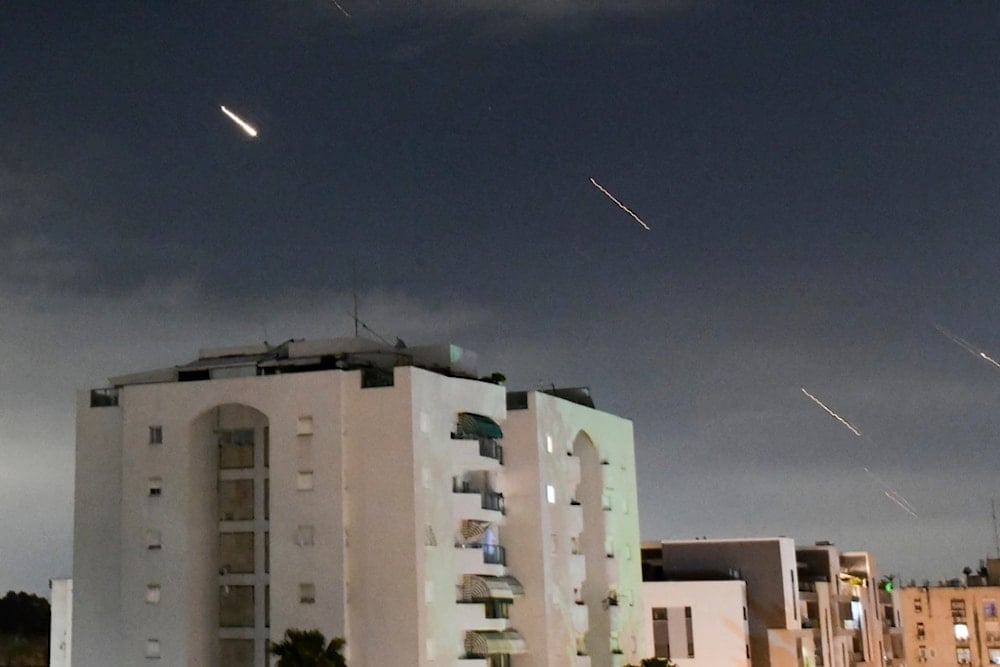'Israel's' attempt to restore deterrence has proven failure: FP
Sajjad Safaei argues that the Israeli occupation entity's bid to reestablish its security "is nowhere near over."
-

Israeli Iron Dome anti-air system launches interceptive missiles toward missiles fired from Iran, on Sunday, April 14, 2024. (AP)
In an opinion piece published in the Foreign Policy news website, Sajjad Safaei, a postdoc fellow at Germany’s Max Planck Institute for Social Anthropology, touches on "Israel's" failed deterrence, especially amid the ongoing battles with the Palestinian Resistance in Gaza, the fighting with Hezbollah, and Iran's retaliatory attack.
Safaei highlighted that since the establishment of the Israeli occupation entity, "no concept has so thoroughly dominated" its strategic imagination as much as deterrence.
He recalled that former Prime Minister Ariel Sharon once said that deterrence was "Israel's" "main weapon—the fear of us," attributing the Palestinian Resistance's Operation Al-Aqsa Flood on October 7 for "an unprecedented existential urgency" to reestablish Israeli deterrence, which according to the writer, "had been steadily waning since Israel’s withdrawal from Lebanon in May 2000."
However, Safaei argued that "Israel's" attempt to restore its deterrence through a war on Gaza and other skirmishes with Hezbollah and Iran has proven a failure for the occupation entity.
"The most basic reason for this failure is that a major military victory, such as decisively crippling Hamas, is still not in sight," he explained, pointing out that the Israeli ground invasion of the Gaza Strip has faced international condemnation, and the Israeli military's notably high casualties there have aggravated previous concerns regarding "the vulnerability of Israel's land forces."
The writer said that "none of this has communicated a message of strength to Israel’s foes—especially not to Hezbollah."
'Hezbollah imposed its own terms of engagement'
Touching on Hezbollah's gains from the fighting on the northern front, Safaei emphasized that the Lebanese Resistance group – without engaging in a full-scale war with "Israel" – forced more than 80,000 Israelis to evacuate northern settlements instead of withdrawing its fighters north of the Litani River as stipulated by UN Resolution 1701.
"In other words, Hezbollah has imposed its own terms of engagement by creating a buffer zone" inside northern occupied Palestine in a grave embarrassment to Israeli deterrence, he indicated.
Safaei even quoted Israeli Maj. Gen. (res.) Gershon Hacohen as saying that Hezbollah "conditions everything that will happen in the future by ending the war in the Gaza Strip. In fact, Hezbollah is the ones who are currently deciding whether they will stop."
In a related context, the writer also touched on Iran's retaliatory attack against the Israeli aggression that targeted the Iranian consulate in the Syrian capital Damascus on April 1.
He highlighted that despite "Israel's" "sophisticated, multilayered air defense system costing billions to construct" and the Israeli officials' claims that 99% of the Iranian projectiles were intercepted, this was done with "a Herculean effort" and "significant assistance from the French, Jordanian, American, and British militaries."
'Israel’s aura of invincibility profoundly shaken'
The writer also described the "unclear" Israeli response to the Iranian retaliatory attack as "extremely underwhelming," suggesting that "unlike Iran, which communicated its intentions through various channels, including the United Nations, Israel’s response to Iran’s retaliation appeared disjointed and lacking in clarity."
Referring to Sharon's idea about Israeli deterrence built on the region's fear of confronting the occupation entity, the writer said that this fear "has become ever more difficult to preserve" with scenes of Iranian missiles flying over occupied Palestinian skies now engraved in the region’s consciousness.
"Israel’s future engagements and tactical decisions will be calibrated by the humbling realization that what remained of Israel’s aura of invincibility has been profoundly shaken."
Elsewhere, Safaei concluded his opinion piece by suggesting that the occupation entity's bid to reestablish its security "is nowhere near over."

 4 Min Read
4 Min Read










